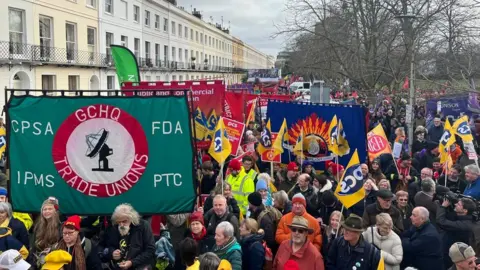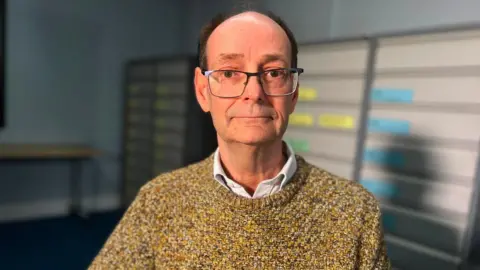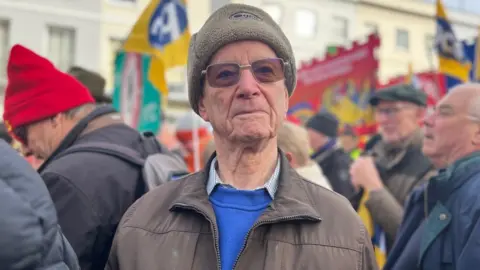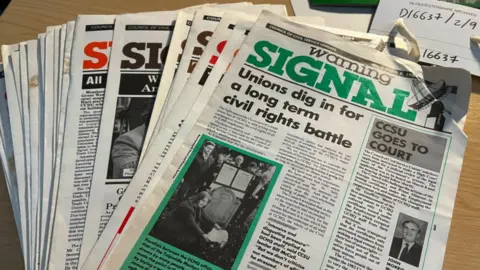GCHQ union ban's 40th anniversary marked by protest in Cheltenham
 BBC
BBCThousands of people attended a protest marking 40 years since GCHQ's controversial ban on trade unions.
Gareth Morris, a former GCHQ employee who was dismissed under Margaret Thatcher's legislation, joined the march in Cheltenham today.
Unions estimate about 5,000 attended.
Mark Serwotka, from the Public and Commercial Services Union, said: "Our message today is the same as it was in 1984 - we shall fight this injustice for however long it takes."
When the former prime minister introduced the ban at GCHQ in 1984 - citing security concerns - most workers quit their unions.
A total of 14 employees refused as a matter of principle, including Mr Morris and Brian Johnson, who also attended today's protest, and they were sacked.
Before the ban was imposed, GCHQ had encouraged its employees to join a union.

Mr Morris, who first joined the intelligence agency in 1978, said the ban was "disgusting", but held on to his position for another five years before being dismissed in 1989.
"It wasn't a normal trade union dispute about pay and conditions - it was about the basic human rights," he said.
The ban was not lifted until 1997, when Tony Blair was elected prime minister, and the employees were able to return to work including Mr Morris.
Unionists have cited parallels between the historical event with the current row over the Strikes (Minimum Service Levels) Act 2023, which was introduced by the government in July.
"It seems sad that 40 years on, we're still having similar situations," Mr Morris said.

Brian Johnson told the BBC on Saturday that losing his job was "something that I just couldn't accept".
"I'd always thought I've got the right for freedom of choice. We fought two world wars to keep that freedom… and to try and deprive everybody of it to me was completely wrong."
Mr Serwotka said the "fantastic turn-out" tells the government two things.
"Firstly, our movement always sticks by those people who pay the ultimate price when they've been treated unfairly," he said.
"But it also tells the government that we're determined not to let them get away with their latest round of anti-union legislation which will deny people the right to strike."

Under the new legislation, "minimum service" must be provided across a number of sectors including health, education and transport, in the event of industrial action.
Some employees could be sacked if they refuse to comply - but unions have warned the law is unworkable.
'Attack on unions'
Paul Nowak, the general secretary of the Trades Union Congress, said: "It doesn't matter how much the government tries to ban, bully and intimidate unions, we know that right is on our side.
"The GCHQ workers had to wait 13 years for justice, but we expect Labour to live up to its commitment to repeal the Strikes Act within 100 days of winning the general election.
"What really depresses me is despite the big issues facing the country - the state of public services, wages, ongoing cost-of-living crisis - the government found time to launch yet another attack on unions."
A government spokesperson said: "The right to strike is protected by law, but the government believes it is important that when workers strike, people's lives and livelihoods are not put at undue risk."

Follow BBC West on Facebook, X and Instagram. Send your story ideas to: [email protected]
